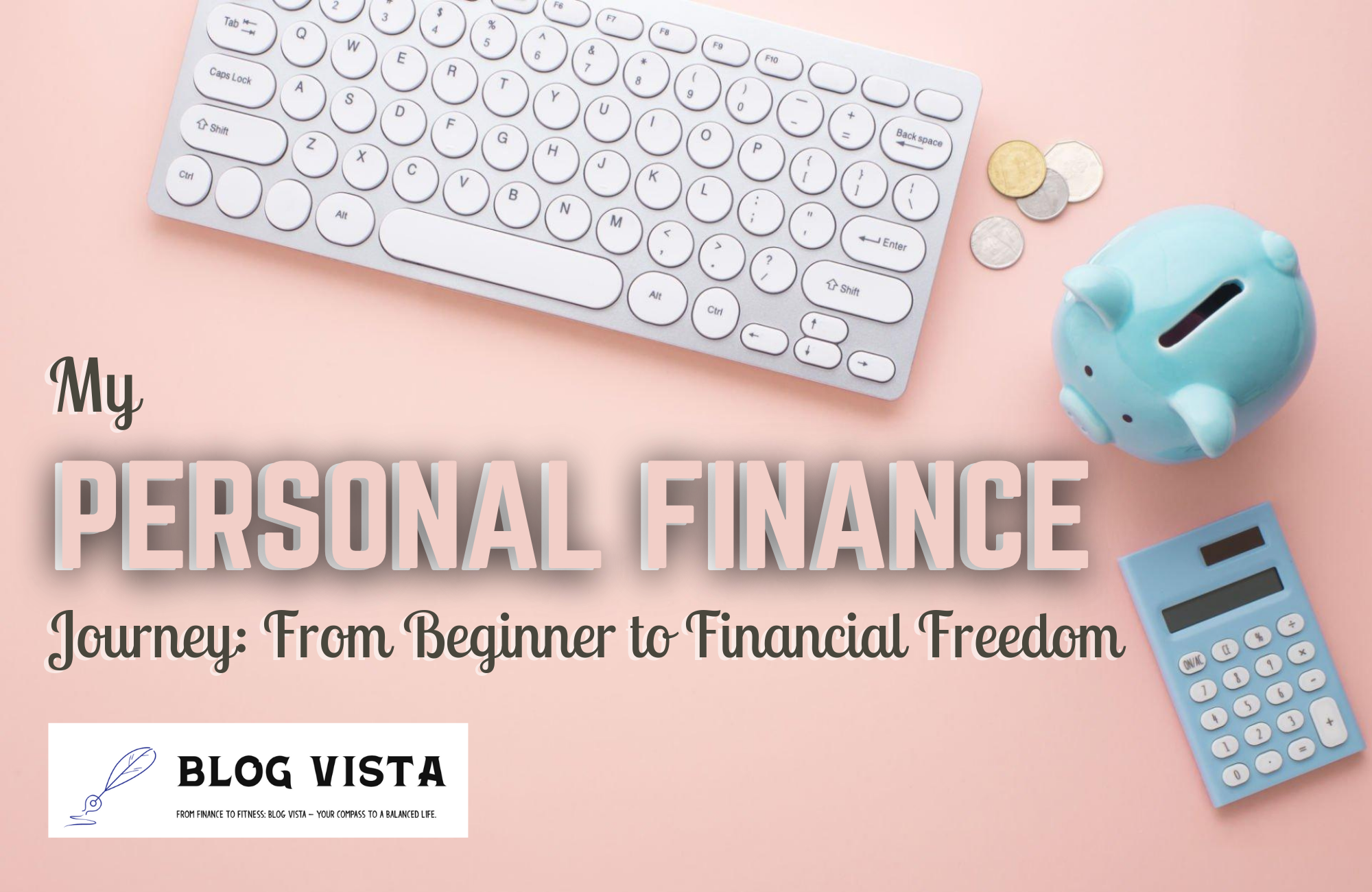Managing my money and achieving financial freedom has been crucial for me, but I struggled with complex financial concepts initially. Through educating myself using personal finance books for beginners and advice from financial experts, I’ve been able to gain control of my financial situation. This blog shares my personal finance journey as a beginner and key lessons I learned along the way.
Getting Started with Budgeting
The first step I took was to start budgeting and track my expenses. I created a simple spreadsheet to list out all my income sources and recurring expenses. This included things like rent, utility bills, grocery costs, entertainment subscriptions, and debt payments. I also tracked variable spending like dining out, shopping and other discretionary purchases. Building this spending snapshot helped me identify where my money was going each month.
With my expense baseline mapped out, I could then budget my income accordingly. I followed the 50/30/20 budget rule. This meant allocating 50% of my income to essentials like housing and bills, 30% to discretionary spending, and 20% to savings and debt repayment. Any extra income left over went straight to my savings account before I could spend it elsewhere.
Using budgeting tools like Mint helped automate expense tracking and simplified the process over time. Sticking to my defined budget each month took discipline, but was essential to take control of my finances.
Making Savings a Habit

After learning how to budget, I focused on building healthy savings habits. Saving money regularly was critical to reach my financial goals like an emergency fund, down payment for a house, vacations, and eventually retirement.
I started by identifying my specific savings goals and end dollar amounts. For example, I wanted to save $10,000 for an emergency fund and $20,000 for a downpayment. This gave me tangible targets to work towards. Automating my savings was a game changer. I set up automatic transfers from my checking account to various high-yield savings accounts tied to each goal. Seeing my savings balances grow steadily kept me motivated.
I began saving 10% of my income and increased the percentage every 6 months. Within a couple years, I was saving 25% of my take-home pay reliably. Saying no to temptations like happy hours and impulse shopping trips became second nature. Staying focused on my saving priorities was key to reaching my goals faster.
Investing to Build Long-Term Wealth
As my savings grew, I researched ways to invest money to make it work harder for me. The stock market seemed intimidating at first. To start, I read personal finance and investing books to educate myself on concepts like risk tolerance, asset allocation, dividends, compound growth and more. I also spoke with financial advisors to get professional advice.
Based on my research and income level, index mutual funds were a good entry point into investing. I opened a retirement account with Vanguard and started contributing to a target date index fund. Opening a Roth IRA with automated transfers allowed me to supersize retirement contributions. Investing was a rollercoaster at first, but I stayed focused on long-term growth.
Over time, I gained confidence and added individual blue chip stocks to my portfolio for greater returns. Reinvesting dividends and dollar cost averaging into the market enabled compounded growth. My net worth skyrocketed as my investments soared over the years.
Staying Disciplined on the Financial Journey

Cultivating financial discipline proved vital on my money journey. Making deliberate, planned purchases that aligned with my budget and financial goals required discipline every day. I avoided impulse purchases that did not move me closer to bigger priorities. Differentiating between wants and needs took practice.
I made paying all bills and loans on time an ingrained habit. Monitoring my credit score monthly helped me keep tabs on any issues. Staying out of high-interest revolving debt was crucial for me. Allowing myself non-negotiable fun money in my budget helped satisfy small splurges guilt-free.
Reading personal finance books, blogs and podcasts became a hobby. This ongoing education kept me motivated and made maintaining discipline easier over time. Having a community of like-minded individuals striving for similar money goals was empowering.
Achieving Financial Freedom on My Terms
Looking back, the financial journey as a beginner was challenging but incredibly worthwhile. Through perseverance and education, I gained control of my money and built wealth. I saved for goals faster than I thought possible and reached a net worth I never dreamed of early in life.
While I’m not financially independent yet, I’m well on my way with passive income streams I’ve created through investing. I still have room for improvement but now feel equipped to manage my finances and continue growing my net worth. I have peace of mind knowing I can weather unexpected expenses and retire comfortably someday.
For anyone new to personal finance, be kind and patient with yourself as you build knowledge. Controlling your money is absolutely possible with commitment to education, budgeting, saving and investing. My finances are far from perfect, but the financial freedom I’ve achieved makes the journey completely worth it.
Overcoming Financial Mistakes Along the Way

My financial journey has not been without missteps. In my early 20s, I made some mistakes that seemed devastating at the time but ultimately taught me valuable lessons.
One of my biggest blunders was racking up thousands in credit card debt through reckless spending. I used cards to finance a lavish vacation and expensive purchases outside my budget. The crippling interest rates made the debt swell uncontrollably.
Digging out from this hole took nearly 2 years by cutting expenses, budgeting diligently, and paying well above the minimums each month. It decimated my savings and was a tough setback early on. However, it taught me to respect credit cards and use them responsibly going forward.
I also regret not starting to invest and save for retirement sooner. My priorities were misplaced in my mid-20s as I focused too much on lifestyle inflation with raises. Starting investing just 5 years earlier could have made a massive difference in growth and compounded returns.
While these money mistakes stalled my progress temporarily, they provided invaluable lessons. I learned to spend within my means, pay balances in full, and always prioritize long-term savings over material items. It’s never too late to course correct your financial path.
Key Takeaways from My Financial Journey
Reflecting on my personal finance experience, a few key themes stand out:
- Make budgeting your foundation – Tracking income and expenses is critical for understanding where your money goes. Budgeting gives you control over your financial life.
- Automate savings and invest early – Put your future first by systematically building short and long-term savings. Time in the market is your best friend.
- Live below your means – Spend less than you earn and avoid debt pitfalls. Delayed gratification pays off.
- Keep learning – Read, listen and talk to others about money. Financial literacy is an ongoing journey.
- Stay disciplined and persevere – There will be setbacks but stick to healthy habits. Good financial health requires diligence and patience.
- You can do this! – Don’t let complexity deter you. With some practical knowledge and discipline, you can absolutely take control of your finances.
My money journey has had ups, downs, and lessons learned but staying focused on small daily progress is key. I hope my experience can help others feel empowered to start taking control of their finances and achieving freedom!
Finding Support Through the Ups and Downs

As much as personal finance is a solo journey, having support made all the difference. I was fortunate to have parents who taught me basic money lessons young, like saving allowance in piggy banks and being careful with borrowing money.
In my adult life, surrounding myself with like-minded individuals focused on similar financial goals kept me motivated. My significant other was my biggest cheerleader, helping me stay on budget and meal prep to save money. Friends with finance backgrounds gave invaluable tips.
Online communities of savers and investors provided camaraderie in reaching milestones. In times of discouragement, their wisdom and success stories inspired me to persevere. My financial advisor also provided objective guidance and accountability along the way.
Giving Back to Help Others' Money Journeys
Now that I’m in a comfortable position financially, I make it a priority to give back and help others on their personal finance path. I volunteer as a financial literacy coach for junior high students in my community. Teaching money basics like budgeting, saving, and avoiding debt gives me joy.
I also make myself available as a mentor for younger colleagues just entering the workforce. Discussing starter salaries, benefits, 401k details, and other financial steps with them reminds me how far I’ve come. I aim to pay the guidance I received forward.
Conclusion
In reflecting on my money journey from a clueless beginner to now, the most important takeaway is that it’s never too late to transform your financial situation. Regardless of how old you are or how little you have in the bank, small positive steps make a massive difference over time.
Educate yourself, make a plan, start budgeting, save what you can, and invest for the long-term. Build a support network and don’t be afraid to ask for help. Learn from mistakes and keep moving forward. With perseverance and discipline, you can absolutely take control of your finances and build wealth at any age or income level.
Here’s to a lifetime of learning, growing, and working towards your money goals! Stay positive and believe in yourself. Your own path to financial freedom is waiting.
Frequently Asked Questions
Start with building a budget to understand where your money is going each month. This will identify areas to cut expenses and free up cash that can then be allocated towards saving and debt repayment goals.
Aim to save 3-6 months' worth of living expenses in your emergency fund. This cash savings provides a buffer for unexpected expenses like medical bills, car repairs, job loss, etc.
Open a retirement account like an IRA or 401k and contribute regularly. Invest in broad market index funds to start as they offer diversification and low fees. Add individual stocks once you build knowledge.
Experts recommend saving at least 10-15% of your gross income, and ramping up to 20% or more over time as your budget allows. Consistently saving is key.
Check your credit report 2-3 times per year and monitor your credit score monthly to catch any suspicious activity or errors early. Maintain good credit by always paying bills on time.
Use credit cards responsibly for the rewards but pay balances in full each month to avoid interest. Debit cards keep spending limited to your account balance.
Cut non-essential costs like cable, downgrade phone plans, brown bag lunches, cancel unused subscriptions, buy generics over brands, and limit dining out.
Automate finances, join online communities, celebrate milestones, remember your why, and focus on how far you’ve come. Consistency is key.


One thought on “My Personal Finance Journey: How I Took Control of My Finances as a Beginner”